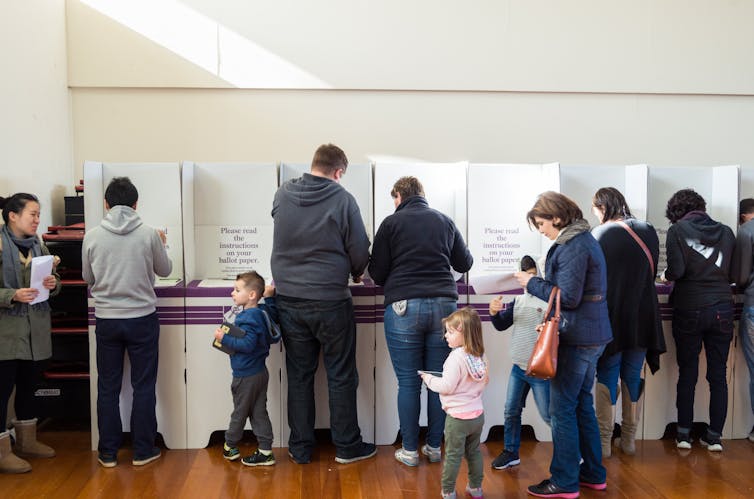Despite more than 30 major inquiries, governments still haven't fixed aged care. Why are they getting away with it?
- Written by The Conversation
This article is part of our series on aged care. You can read the other articles in the series here[1].
Australia’s aged care sector has been the subject of more than 30 major[2] inquiries and reviews since 1997.
It is fair to say the findings have been highly critical[3] of the way aged care is run in this country. Many of these concerns have been brought to light again — along with new issues raised — in the ongoing Royal Commission[4] into Aged Care Quality and Safety.
Yet, as the royal commission has noted[5], successive Australian governments have shown a “lack of willingness to commit to change”.
Responses often come years after the review and recount what has been done in an almost tangential way.
Even the establishment of the royal commission was not based on previous inquiries or recommendations, but in response to media exposés[6] of the appalling conditions in some aged care facilities.
Read more: Aged care failures show how little we value older people – and those who care for them[7]
From these dysfunctional circumstances, three questions arise.
First, what are the ongoing issues with aged care in Australia?
Second, why have successive governments been comfortable making do with piecemeal solutions rather than truly “fixing[8]” aged care, once and for all?
Finally, and most perplexingly, why have Australian voters let them get away with it?
What’s the problem?
It is important to emphasise that aged care is predominantly a federal government responsibility. The 1997 Aged Care Act[9] is the main law covering government-funded aged care. This includes rules for funding, regulation, approval of providers, quality of care and the rights of those in care.
 The Royal Commission released a damning interim report into aged care in October 2019.
www.shutterstock.com
The Royal Commission released a damning interim report into aged care in October 2019.
www.shutterstock.com
Since 2019, the federal Aged Care Quality and Safety Commission Act[10] regulates complaints, sanctions and enforcement, but has been criticised for lacking teeth[11].
The 1997 act diluted many preexisting regulatory protections, such as strict financial accreditation and staffing requirements, and opened the sector up to privatisation. At the time, concerns were raised[12] the new regime could compromise standards of care in aged care facilities and disadvantage older people on lower incomes.
The concerns were raised again and amplified in subsequent years. For example, in 2011, a Productivity Commission report[13] noted Australia’s aged care system needed a “fundamental redesign”.
Here is a brief summary of the recurring issues raised in multiple reports:
the huge difficulty people have navigating[14] the aged care system, including finding accurate information about facilities
failure to meet the needs of vulnerable[15] older people
poor quality care, especially for those with dementia[16] and other disabilities
the use of chemical or physical restraints[17]
inappropriate staff ratios and poor training[18][19]
the rising cost of care[20], especially in light of an ageing population
adherence to accreditation[21] standards
ineffective complaints[22] mechanisms.
Why haven’t these problems been fixed?
One of the major hurdles to real reform is the relationship[23] between the aged care industry and the federal government.
The government funds the sector and provides a relatively “light-touch[24]” oversight, while the providers attend to the day-to-day running of the facilities.
Read more: Federal government did not prepare aged care sector adequately for COVID: royal commission[25]
However, there is concern this alignment has meant successive governments are not as involved as they should be and proposals for change are diluted by the influence of industry lobbyists[26].
Another reason for governments’ reluctance to intervene is many of the providers are “too big to fail[27]”. A facility’s licence and government funding can be withdrawn if standards are not met. Yet this rarely happens[28].
Why? Because if a licence is revoked, residents need somewhere to go. The issues here can be seen in the closure of the Earle Haven[29] nursing home in July 2019. Here, 68 elderly people were left homeless and had to be moved to hospitals and other aged care facilities.
As a further example, Bupa, one of Australia’s largest providers, continues to operate[30], despite sanctions or failing fundamental assessments.
Why isn’t aged care a vote winner?
After so many inquiries and so many horror headlines[31], the problems in aged care are well and truly common knowledge. But do Australians care enough about aged care for it to influence their vote — and so, influence the way governments respond?
If we cast our minds back to the 2019 federal election campaign, the hot button issue concerning older people was the potential demise of franking credits[32] and negative gearing.
 Aged care issues did not feature prominently in the 2019 federal election.
www.shutterstock.com
Aged care issues did not feature prominently in the 2019 federal election.
www.shutterstock.com
In-home and residential aged care barely rated a mention in the campaigns of the major parties.
Even now, despite the publicity surrounding[33] the royal commission, if an election was held today, would this issue actually influence voting intentions? Sadly, it seems unlikely.
During the July 2020 Eden-Monaro byelection, a survey of nearly 700 voters[34] showed while 84% believed the aged care system was “in crisis”, this influenced the vote of less than 4% of respondents. It also ranked last in a list of seven issues of importance.
When heartfelt concern does not translate to winning votes, there is little incentive for the federal government to provide meaningful solutions to well-documented problems.
Read more: The budget must address aged care — here are 3 key priorities[35]
We only need to look to the record spending in the 2020 Budget, which provided only 23,000 extra[36] home care packages and deferred consideration[37] of funding for residential aged care until the royal commission’s final report next year.
It comes back to voters
Why does concern for the plight of people in aged care fail to generate public action?
We suggest it is because many Australians consciously or unconsciously have ageist attitudes[38] — that older people are inherently not important. On this front, look no further than arguments made by prominent commentators[39] about the fate of older people during COVID-19.
Yes, most fair-thinking Australians care about our older citizens, yet until either we or our family members are directly impacted, we do not prioritise it.
If we don’t care enough or care about other things more, nothing will change. And, while this remains the case, the government will have no reason to do more than just tinker with an unsatisfactory status quo.
Read more: If we have the guts to give older people a fair go, this is how we fix aged care in Australia[40]
References
- ^ series here (theconversation.com)
- ^ more than 30 major (agedcare.royalcommission.gov.au)
- ^ highly critical (agedcare.royalcommission.gov.au)
- ^ Royal Commission (agedcare.royalcommission.gov.au)
- ^ royal commission has noted (agedcare.royalcommission.gov.au)
- ^ media exposés (www.abc.net.au)
- ^ Aged care failures show how little we value older people – and those who care for them (theconversation.com)
- ^ fixing (www.canberratimes.com.au)
- ^ Aged Care Act (www.health.gov.au)
- ^ Aged Care Quality and Safety Commission Act (www.legislation.gov.au)
- ^ lacking teeth (www.smh.com.au)
- ^ concerns were raised (www.aph.gov.au)
- ^ Productivity Commission report (www.pc.gov.au)
- ^ navigating (agedcare.royalcommission.gov.au)
- ^ vulnerable (www.pc.gov.au)
- ^ dementia (www.aph.gov.au)
- ^ restraints (www.aph.gov.au)
- ^ staff ratios (agedcare.royalcommission.gov.au)
- ^ training (www.health.gov.au)
- ^ cost of care (agedcare.royalcommission.gov.au)
- ^ accreditation (apo.org.au)
- ^ complaints (www.anao.gov.au)
- ^ relationship (grattan.edu.au)
- ^ light-touch (www.monash.edu)
- ^ Federal government did not prepare aged care sector adequately for COVID: royal commission (theconversation.com)
- ^ industry lobbyists (medium.com)
- ^ too big to fail (www.abc.net.au)
- ^ rarely happens (www.abc.net.au)
- ^ Earle Haven (www.theguardian.com)
- ^ continues to operate (www.abc.net.au)
- ^ horror headlines (www.abc.net.au)
- ^ franking credits (www.abc.net.au)
- ^ publicity surrounding (www.theguardian.com)
- ^ survey of nearly 700 voters (www.agedcareinsite.com.au)
- ^ The budget must address aged care — here are 3 key priorities (theconversation.com)
- ^ 23,000 extra (www.abc.net.au)
- ^ deferred consideration (grattan.edu.au)
- ^ ageist attitudes (fbe.unimelb.edu.au)
- ^ prominent commentators (www.theguardian.com)
- ^ If we have the guts to give older people a fair go, this is how we fix aged care in Australia (theconversation.com)

















